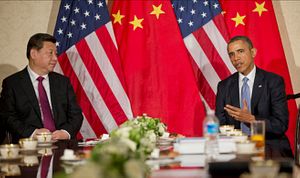Much has been made about the Leaders’ Summit portion of the APEC meetings in Beijing next week, as the bilateral meetings between some of the world’s most powerful leaders usually make for the most newsworthy headlines. However, one of the key reasons for the APEC summit should not get lost in the search for sound bites and photo opportunities. The summit’s two most influential attendees, the U.S. and China, will be touting their own unique regional free trade agreements, which represent a larger struggle for preeminence in the Asia-Pacific
According to the Yomiuri Shimbun, the U.S.-led Trans-Pacific Partnership (TPP) talks will be held on the 11th, the second day of the Leaders’ Summit. While Washington has expressed hope that the FTA could reach an agreed framework by the end of this year, the agreement’s other main partner Japan has indicated that nothing of the sort will happen before next year at the earliest. Still, next week will be a rare opportunity for the TPP’s leaders to assemble and discuss the pact, although any significant breakthrough on the major sticking points of Japan’s protected auto and agricultural sectors is highly unlikely at this point.
China’s preferred FTA, the Free Trade Area of the Asia-Pacific (FTAAP), is seen as sort of a bridge between the TPP and ASEAN’s Regional Comprehensive Economic Partnership (RCEP), which would unite ASEAN with the six countries it already has FTAs with (including Japan, India and China). The FTAAP would create a substantially larger FTA than either of the other currently negotiated pacts; however, the U.S. is uninterested in cooperating with the FTAAP as it sees the agreement as detrimental to the TPP, not to mention challenging America’s central role in any regional FTA by including China.
Neither Beijing’s nor Washington’s trade agreement is in danger of being implemented any time soon, although the TPP has a shot at becoming reality in the medium term. In May, APEC trade representatives failed to even agree on a timeline to implement the FTAAP by 2025, and discussions in Beijing next week will center around “a strategic study of what an FTAAP could mean in detail,” according to APEC executive director Alan Bollard. However, as the summit is being held in China, look for Beijing’s FTA to be given greater prominence on the official agenda, as the country seeks to even the regional economic playing fi

































